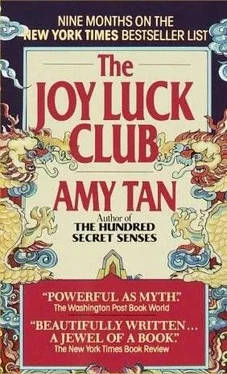And after that I began to see terrible things. I saw these things with my Chinese eyes, the part of me I got from my mother. I saw devils dancing feverishly beneath a hole I had dug in the sandbox. I saw that lightning had eyes and searched to strike down little children. I saw a beetle wearing the face of a child, which I promptly squashed with the wheel of my tricycle. And when I became older, I could see things that Causasian girls at school did not. Monkey rings that would split in two and send a swinging child hurtling through space. Tether balls that could splash a girl's head all over the playground in front of laughing friends.
I didn't tell anyone about the things I saw, not even my mother. Most people didn't know I was half Chinese, maybe because my last name is St. Clair. When people first saw me, they thought I looked like my father, English-Irish, big-boned and delicate at the same time. But if they looked really close, if they knew that they were there, they could see the Chinese parts. Instead of having cheeks like my father's sharp-edged points, mine were smooth as beach pebbles. I didn't have his straw-yellow hair or his white skin, yet my coloring looked too pale, like something that was once darker and had faded in the sun.
And my eyes, my mother gave me my eyes, no eyelids, as if they were carved on a jack-o'-lantern with two swift cuts of a short knife. I used to push my eyes in on the sides to make them rounder. Or I'd open them very wide until I could see the white parts. But when I walked around the house like that, my father asked me why I looked so scared.
I have a photo of my mother with this same scared look. My father said the picture was taken when Ma was first released from Angel Island Immigration Station. She stayed there for three weeks, until they could process her papers and determine whether she was a War Bride, a Displaced Person, a Student, or the wife of a Chinese-American citizen. My father said they didn't have rules for dealing with the Chinese wife of a Caucasian citizen. Somehow, in the end, they declared her a Displaced Person, lost in a sea of immigration categories.
My mother never talked about her life in China, but my father said he saved her from a terrible life there, some tragedy she could not speak about. My father proudly named her in her immigration papers: Betty St. Clair, crossing out her given name of Gu Ying-ying. And then he put down the wrong birthyear, 1916 instead of 1914. So, with the sweep of a pen, my mother lost her name and became a Dragon instead of a Tiger.
In this picture you can see why my mother looks displaced. She is clutching a large clam-shaped bag, as though someone might steal this from her as well if she is less watchful. She has on an ankle-length Chinese dress with modest vents at the side. And on top she is wearing a Westernized suit jacket, awkwardly stylish on my mother's small body, with its padded shoulders, wide lapels, and oversize cloth buttons. This was my mother's wedding dress, a gift from my father. In this outfit she looks as if she were neither coming from nor going to someplace. Her chin is bent down and you can see the precise part in her hair, a neat white line drawn from above her left brow then over the black horizon of her head.
And even though her head is bowed, humble in defeat, her eyes are staring up past the camera, wide open.
"Why does she look scared?" I asked my father.
And my father explained: It was only because he said "Cheese," and my mother was struggling to keep her eyes open until the flash went off, ten seconds later.
My mother often looked this way, waiting for something to happen, wearing this scared look. Only later she lost the struggle to keep her eyes open.
"Don't look at her," said my mother as we walked through Chinatown in Oakland. She had grabbed my hand and pulled me close to her body. And of course I looked. I saw a woman sitting on the sidewalk, leaning against a building. She was old and young at the same time, with dull eyes as though she had not slept for many years. And her feet and her hands-the tips were as black as if she had dipped them in India ink. But I knew they were rotted.
"What did she do to herself?" I whispered to my mother.
"She met a bad man," said my mother. "She had a baby she didn't want."
And I knew that was not true. I knew my mother made up anything to warn me, to help me avoid some unknown danger. My mother saw danger in everything, even in other Chinese people. Where we lived and shopped, everyone spoke Cantonese or English. My mother was from Wushi, near Shanghai. So she spoke Mandarin and a little bit of English. My father, who spoke only a few canned Chinese expressions, insisted my mother learn English. So with him, she spoke in moods and gestures, looks and silences, and sometimes a combination of English punctuated by hesitations and Chinese frustration: " Shwo buchulai "-Words cannot come out. So my father would put words in her mouth.
"I think Mom is trying to say she's tired," he would whisper when my mother became moody.
"I think she's saying we're the best darn family in the country!" he'd exclaim when she had cooked a wonderfully fragrant meal.
But with me, when we were alone, my mother would speak in Chinese, saying things my father could not possibly imagine. I could understand the words perfectly, but not the meanings. One thought led to another without connection.
"You must not walk in any direction but to school and back home," warned my mother when she decided I was old enough to walk by myself.
"Why?" I asked.
"You can't understand these things," she said.
"Why not?"
"Because I haven't put it in your mind yet."
"Why not?"
"Aii-ya! Such questions! Because it is too terrible to consider. A man can grab you off the streets, sell you to someone else, make you have a baby. Then you'll kill the baby. And when they find this baby in a garbage can, then what can be done? You'll go to jail, die there."
I knew this was not a true answer. But I also made up lies to prevent bad things from happening in the future. I often lied when I had to translate for her, the endless forms, instructions, notices from school, telephone calls. " Shemma yisz? "-What meaning?-she asked me when a man at a grocery store yelled at her for opening up jars to smell the insides. I was so embarrassed I told her that Chinese people were not allowed to shop there. When the school sent a notice home about a polio vaccination, I told her the time and place, and added that all students were now required to use metal lunch boxes, since they had discovered old paper bags can carry polio germs.
"We're moving up in the world," my father proudly announced, this being the occasion of his promotion to sales supervisor of a clothing manufacturer. "Your mother is thrilled."
And we did move up, across the bay to San Francisco and up a hill in North Beach, to an Italian neighborhood, where the sidewalk was so steep I had to lean into the slant to get home from school each day. I was ten and I was hopeful that we might be able to leave all the old fears behind in Oakland.
The apartment building was three stories high, two apartments per floor. It had a renovated façade, a recent layer of white stucco topped with connected rows of metal fire-escape ladders. But inside it was old. The front door with its narrow glass panes opened into a musty lobby that smelled of everybody's life mixed together. Everybody meant the names on the front door next to their little buzzers: Anderson, Giordino, Hayman, Ricci, Sorci, and our name, St. Clair. We lived on the middle floor, stuck between cooking smells that floated up and feet sounds that drifted down. My bedroom faced the street, and at night, in the dark, I could see in my mind another life. Cars struggling to climb the steep, fog-shrouded hill, gunning their deep engines and spinning their wheels. Loud, happy people, laughing, puffing, gasping: "Are we almost there?" A beagle scrambling to his feet to start his yipping yowl, answered a few seconds later by fire truck sirens and an angry woman hissing, "Sammy! Bad dog! Hush now!" And with all this soothing predictability, I would soon fall asleep.
Читать дальше












